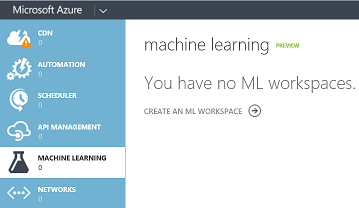 Many of the goals behind big data involve using data to find trends and predict behavior. The process of creating complex algorithms that to do this is known as Machine Learning. In the past, large enterprises have leveraged machine learning to their advantage, employing data scientists to create models that predict things like hospital readmission likelihoods.
Many of the goals behind big data involve using data to find trends and predict behavior. The process of creating complex algorithms that to do this is known as Machine Learning. In the past, large enterprises have leveraged machine learning to their advantage, employing data scientists to create models that predict things like hospital readmission likelihoods.
Building a machine learning system used to require a great amount of effort. Highly technical statisticians, programmers and data scientists were needed to do things like collect and massage data into a form which could be used by the model. The software that was used to develop these tools required a considerable amount of expertise and could be very expensive.
All of this meant time and effort from a highly skilled, hard to find staff of specialists. Because of this, machine learning was just not accessible to smaller organizations. With its new Azure ML suite, Microsoft is aiming to make complicated ML a thing of the past and accessible to smaller organizations and less specialized data professionals.
 Azure ML promises to reduce complexity “by leveraging the cloud” to make machine learning accessible to the small and medium business. Gone are the days of powerful computers running complex neural networks. Azure is going to allow anyone to perform ML with just a browser and cloud access.
Azure ML promises to reduce complexity “by leveraging the cloud” to make machine learning accessible to the small and medium business. Gone are the days of powerful computers running complex neural networks. Azure is going to allow anyone to perform ML with just a browser and cloud access.
The fact that Azure ML is a cloud service means that there is no software installation or hardware to be bought and managed. Using the ML Studio tool from a web browser, even a novice data scientist will be able to develop models, graph data flow and set up experiments. Users are able to leverage the research that Microsoft has done themselves by being able to access Bing and Xbox algorithms and sample experiments.
Seasoned data scientists will also be able to use the open-source statistical programming language called R. Azure ML will integrate with pre-written R packages as well as allow R development in the ML Studio environment. Azure ML is another example of the move towards self-service data discovery provided by the cloud. Notes Joseph Sirosh, head of Machine Learning at Microsoft: “When I started my career in 1995, it took a large organization to build and deploy credit card fraud detection systems. With tools like Azure ML and the power of the cloud, a single talented data scientist can accomplish the same feat.” .

